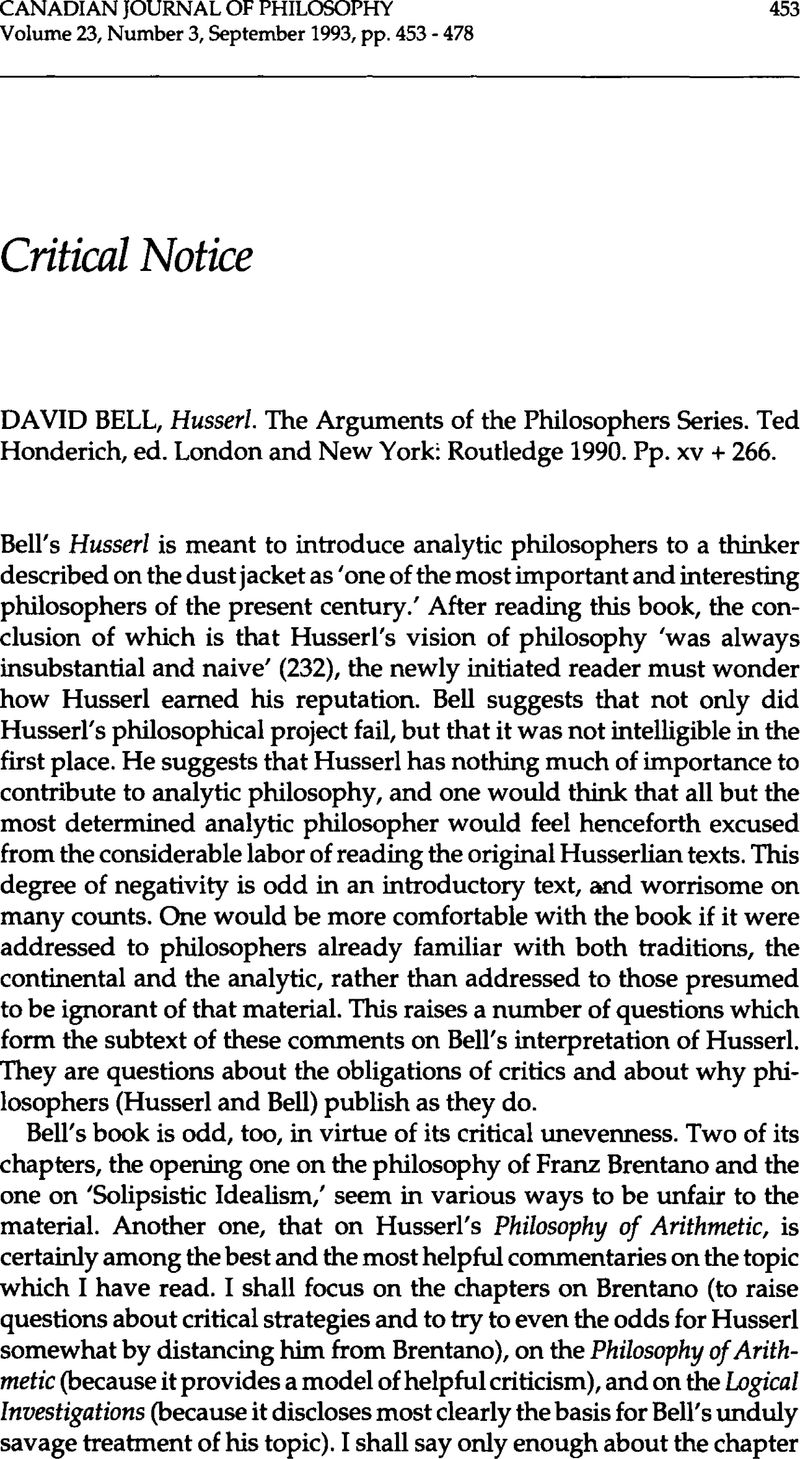No CrossRef data available.
Published online by Cambridge University Press: 01 January 2020

1 Cf. Smith, David Woodruff The Circle of Acquaintance, Perception, Consciousness, and Empathy, Synthese Library 205 (Dordrecht\Boston\London: Kluwer Academic Publishers 1989CrossRefGoogle Scholar.
2 Bell is quoting Dummett, M.A.E. The Interpretation of Frege’s Philosophy (London: Duckworth 1981), 39Google Scholar.
3 Cf., e.g., Zaner, Richard The Way of Phenomenology: Criticism as a Philosophical Discipline (New York: Pegasus 1970), 128-9Google Scholar.
4 E.g., further clarification and discussion of Brentano’s notion of judgment is called for. Certainly others (Descartes among them) have understood that there may be a coherent non-propositional account of judgment. One would have to understand the judgment theory within the larger context of Brentano’s overthrow and complete reconstruction of elementary logic, a labor from which Bell excuses himself because it is not important to his Husserl critique. Cf. 14.
5 ‘Erinnerungen an Franz Brentano,’ in Kraus, Oskar Franz Brentano: Zur Kenntnis seines Lebens und seiner Lehre (Munich 1919), Supplement II, 153-67Google Scholar. This is extensively quoted in Osborn, Andrew D. Philosophy of Edmund Husserl (New York: Garland 1980)Google Scholar. (My remarks are based on Osborn’s quotations and paraphrases.)
6 Cf. E. Husserl, ‘Letter to E. Parl Welch’ (June 17-21, 1933), reproduced in Spiegelberg, Herbert ‘Husserl’s Way into Phenomenology for Americans,’ in Kersten, F. and Zaner, R. eds., Phenomenology: Continuation and Criticism, Phaenomenologica 50 (The Hague: Martin us Nijhoff 1973), 168-91CrossRefGoogle Scholar, at 180. Cf. also Farber, Marvin The Foundation of Phenomenology: Edmund Husserl and the Quest for a Rigorous Science of Philosophy (Albany: State University of New York 1943), 8Google Scholar.
7 Husserl; credits William James for his mature form of descriptive analysis in Logical Investigations, Vol. 1 (London: Routledge and Kegan Paul 1970), 420.
8 Cf. ‘Recollection,’ Kraus 158-9, cited by Osborn, 18. Osborn also cites Kraft, Julius Von Husserl zu Heidegger (Leipzig: H. Buske 1932), 38-40Google Scholar, on the possibility that Husserl is indebted to Fichte and Schelling for his ideas on intuition (8).
9 Cf. Farber, 14-15. Farber sees this ‘pre-phenomenological’ work, the Arithmetic, and not the Psychology from an Empirical Standpoint, as containing ‘the best key to understanding Husserl’s philosophy’ (25). Dorion Cairns also sees the Arithmetic as ‘unconsciously transcendental phenomenological,’ a respect in which it would be very opposed to the Psychology. Cf. Cairns, Dorion ‘A Letter to John Wild about Husserl,’ Research in Phenomenology 5 (1975) 155-81, at 159Google Scholar.
10 These appear as an appendix in Brentano, Franz Wahrheit und Evidenz, Kraus, Oskar ed. (Leipzig: H. Buske 1930)Google Scholar. Kraus, in his preface to the 1924 edition of Psychology from an Empirical Standpoint, catalogs Husserl’s misunderstandings of Brentano. This is reprinted as an appendix to the English edition (London: Routledge 1973). Herbert Spiegelberg mentions that Brentano regarded both Husserl’s phenomenology and Meinong’s Gegenstandstheorie as ‘utterly fantastic’ and a betrayal of his scientific intentions. Cf. his The Phenomenological Movement: A Historical Introduction, Vol. I (The Hague: Martinus Nijhoff 1965), 48.
11 Ibid., 30, my emphasis. Spiegelberg devotes a chapter of The Phenomenological Movement to Stumpf, but cautions against simplistically reading Stumpf’s phenomenology into Husserl’s.
12 Ibid., 32 and 35
13 Cf. also ‘Letter to E. Parl Welch,’ 180.
14 Spiegelberg, ‘Husserl’s Way into Phenomenology for Americans,’ 179-80
15 It may well be that the supposition of a necessary link between Brentano and Husserl has been forged in the analytic mind by Chisholm’s, Roderick popular book, Realism and the Background of Phenomenology (Glencoe, IL: Free Press 1960)Google Scholar. Chisholm constructively uses Brentano, for whom he has a measure of respect, as an opening for an exploration of phenomenology.
16 Cf. Mohanty, J.N. ‘Husserl and Frege: A New Look at their Relationship,’ Research in Phenomenology 4 (1974), 51-62CrossRefGoogle Scholar.
17 Cf. his Logical Investigations, 420.
18 ‘As regards my frank critique of the psychologistic logic and epistemology, I have but to recall Goethe’s saying: There is nothing to which one is more severe than the errors that one has just abandoned’ (Foreword to the first edition, Logical Investigations, 43).
19 Husserl, Edmund Ideas Pertaining to a Pure Phenomenology and to a Phenomenological Philosophy, first book, Kersten, F. trans. (The Hague\Boston\Lancaster: Martinus Nijhoff 1983), 61Google Scholar
20 Cf. n. 45 to Chapter I, where Bell indicates that Husserl does not confuse the objective and the subjective, but criticizes him for failing to explain the relation, construed as that between the ontological and the epistemological (241).
21 Perhaps Bell thinks you cannot have an epistemological problem of reconciling the subjective and the objective without also having the ontological problem. 1n that case skepticism is the only alternative to realism.
22 One of the many difficulties with Bell’s analysis of Ideas is that he disassociates ‘transcendental’ and ‘methodological’ solipsism. That is a mistake, one of the consequences of which is to make of Husserl a real solipsist.
23 Cf. Bell, 162; Ideas, 46.
24 For recent examples, cf. Soffer, Gail Husserl and the Question of Relativism, Phaenomenologica 122 (Dordrecht/Boston/London: Kluwer 1991)CrossRefGoogle Scholar on continuity; Buckley, R. Philip Husserl, Heidegger, and the Crisis of Philosophical Responsibility, Phaenomenologica 125 (Dordrecht/Boston/London: Kluwer 1992)CrossRefGoogle Scholar for the usual reading of Husserl’s ‘Philosophy as a science … the dream is over’ remark.